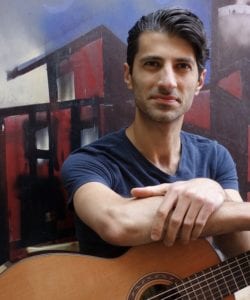It’s Never Too Late to Find Your Passion
Bellevue College music faculty member Naeim Rahmani began studying classical guitar, with no prior formal musical training, in his early 20s. Rahmani began taking guitar classes after immigrating to Washington state from Iran and quickly advanced, gaining entrance to the University of Washington School of Music and then the University of Wisconsin- Milwaukee for graduate school. He has been teaching nationally and internationally since graduating in 2014 and has quickly made a name for himself, performing regularly around the Seattle area and receiving prizes at national guitar competitions. Outside of his performance career, Rahmani is the director of the Seattle-Isfahan Music Project. This collaborative endeavor was created as a way to forge connections between musicians in Seattle and in his hometown of Isfahan, Iran.
What draws you to classical guitar performance?
I often get asked why I chose the guitar as my instrument and I always find myself struggling to answer. I really don’t know exactly when my interest in the guitar started to take root. But from a young age I was interested in it. Of course, I never heard any classical guitar in Iran, but probably I saw someone strumming and singing, which is very common, or maybe I just thought it was a cool thing to play a guitar. We all are drawn to different things because deep down there is a connection; for me it was the sound of the guitar. I would say that I didn’t pick the guitar, the guitar picked me. When I listened for the first time to classical guitar, I knew that was the style that I really connected with. I chose the classical style because it speaks to me in a way that other musical styles don’t.
How do your musical background and influences affect your teaching style?
I am serious about my art and also the way I teach it. At the same time, I am a very musical person and I like to bring that out in my teaching. I also love collaborating with different musicians and playing in small ensembles. There is so much to be learned by collaboration and performing in ensembles, so ensemble playing is a big part of my guitar classes on campus. It’s really fun to play in a group. Students are more engaged. They learn from each other and create something that is meant to be shared.
What do you see as some of the benefits of music education?
It teaches students the sense of responsibility, discipline and persistence that is needed to succeed in any field. All musicians have to work hard to get where they want to be. When you are learning an instrument, you start learning about yourself and how you work. You start to learn about your productive and creative times of day, how to manage your time; you learn that your music needs to be presentable. You develop skills in problem-solving and being curious and open. To me, all of that is a recipe for success.
How did you come to be the director of the Seattle-Isfahan Music Project?
I was born and raised in Isfahan, Iran, and I have a strong connection with that city. All of my music education has been in the United States. So I was really in need of finding a way to connect with the musicians back home and I wanted to create a collaborative workspace where performers and composers from the two cities can come together. And, that’s how the Seattle-Isfahan Music Project came about.
Why are musical projects such as this important not only for the music community, but the community at large?
Personally, it’s important to me to educate the community here about the wealth of music, art and literature that exists in Iranian culture. But I am also trying to use this project to bring attention to some of the lesser known crises inside the country. For example, my latest project has to do with the water crisis that is happening now in Iran. Of course, this is something that the scientists and policymakers are worrying about, but we can also try to capture what is happening and how it feels through music.
What are some of the goals you have for the Seattle-Isfahan Music Project?
One of my goals, or I should say dreams, for this project is to travel with our ensemble to Isfahan, Iran, and collaborate with the musicians back home. I would also love to present one of our programs at the Tehran International Contemporary Music Festival. But until there is a more stable political climate, everything will be done remotely, as physical exchange is not possible. While we wait for that day, my goal is to continue commissioning and performing the music of young upcoming Iranian composers in the contemporary field.
– by Evan Esptein
Last Updated March 5, 2024

